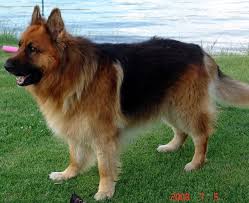
King Shepherd
Conditions of detention
King Shepherds thrive in homes with ample space to roam and exercise. They do best in houses with large, secure yards where they can play and explore. These dogs are not well-suited for apartment living due to their size and exercise needs.
Useful Fact: King Shepherds are happiest when they have a job to do or when they can participate in family activities, as they are highly social and enjoy being involved.
Nutrition and diet
A balanced diet rich in high-quality protein, fats, and essential nutrients is crucial for a King Shepherd’s health. Both high-quality commercial dog food and well-prepared homemade diets can meet their nutritional needs.
Useful Fact: Due to their large size and high energy levels, King Shepherds may require more food than the average dog, especially during growth phases and active working periods.
Health
King Shepherds are generally healthy dogs with a lifespan of 10-14 years. However, they can be prone to certain genetic conditions such as hip dysplasia, elbow dysplasia, and bloat.
Useful Fact: Regular veterinary check-ups, maintaining a healthy diet, and ensuring proper exercise can help prevent common health issues in King Shepherds.
Grooming and care
King Shepherds have a dense double coat that requires regular grooming. Their coat, which can come in various colors including black, tan, sable, and bi-color, sheds seasonally and needs frequent brushing to manage shedding and keep it healthy.
Useful Fact: During shedding seasons, typically twice a year, daily brushing is recommended to manage their dense fur.
Education and training
King Shepherds are intelligent and eager to learn, making them relatively easy to train. Positive reinforcement methods work best, as these dogs respond well to rewards and praise.
Useful Fact: Early socialization and obedience training are crucial for King Shepherds to develop into well-mannered adults, helping them balance their protective instincts with sociability.
Toys and entertainment
King Shepherds enjoy toys that challenge their minds and provide physical exercise. They particularly love interactive toys, puzzle games, and activities that involve play and companionship.
Useful Fact: Providing a variety of toys and engaging in regular play sessions can help keep a King Shepherd mentally and physically stimulated.
Safety
Ensure your King Shepherd has a secure, fenced yard to prevent them from wandering, as their strong protective instincts can lead them to patrol large areas.
Useful Fact: King Shepherds are naturally alert and make excellent watchdogs, but their protective instincts should be managed with proper training to prevent over-guarding.
Accessories
A sturdy leash, comfortable harness, and ID tags are essential for your King Shepherd’s safety during walks and outings.
Useful Fact: Due to their size and strength, King Shepherds benefit from wearing a harness rather than a collar, as it helps distribute pressure evenly and prevents neck strain during walks.
Socialization
Early and continuous socialization is crucial for King Shepherds to ensure they are comfortable around people, other dogs, and different environments.
Useful Fact: Positive socialization experiences from a young age can help King Shepherds develop into well-adjusted adults, reducing the likelihood of fear or aggression.
Travel and Transportation
King Shepherds can travel well if accustomed to it from a young age. Ensure they have a comfortable crate or seatbelt harness for car rides.
Useful Fact: Regular short trips can help your King Shepherd become more comfortable with travel and reduce anxiety during longer journeys.
Behavior and psychology
King Shepherds are known for their loyalty, intelligence, and protective nature. Understanding their behavior and providing appropriate outlets for their energy is important.
Useful Fact: Mental stimulation through training and interactive play is as important as physical exercise for a King Shepherd’s well-being.
Legal aspects
Owning a King Shepherd may come with specific legal requirements depending on your location, such as licensing, microchipping, and adherence to leash laws.
Useful Fact: Research local regulations and ensure you comply with any breed-specific legislation or requirements.


